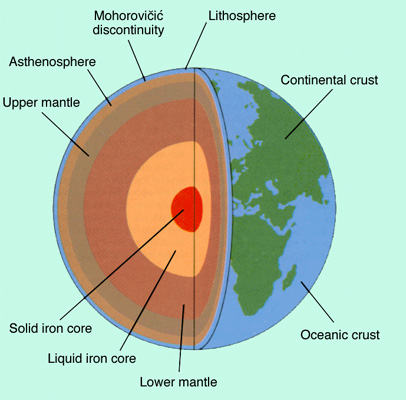1. vb. [Drilling]
To deepen the wellbore by way of collecting a cylindrical sample of rock. A core bit is used to accomplish this, in conjunction with a core barrel and core catcher. The bit is usually a drag bit fitted with either PDC or natural diamond cutting structures, but the core bit is unusual in that it has a hole in its center. This allows the bit to drill around a central cylinder of rock, which is taken in through the bit and into the core barrel. The core barrel itself may be thought of as a special storage chamber for holding the rock core. The core catcher serves to grip the bottom of the core and, as tension is applied to the drillstring, the rock under the core breaks away from the undrilled formation below it. The core catcher also retains the core so that it does not fall out the bottom of the drillstring, which is open in the middle at that point.
See related terms: diamond bit, drag bit, polycrystalline diamond compact bit
2. n. [Geology]
Innermost layer of the Earth. Studies of compressional and shear waves indicate that the core makes up nearly 3500 km [2170 miles] of the Earth's radius of 6370 km [3950 miles]. Such studies also demonstrate that because shear waves do not pass through the outer part of the core (2250 km [1400 miles] thick), it is liquid (only solids can shear). The inner core is solid and 1220 km [750 miles] thick. The core's iron and nickel composition was inferred through studies of the Earth's gravitational field and average density. The relatively low density of the outer layers of the Earth suggests a dense inner layer.
See related terms: asthenosphere, crust, lithosphere, mantle, plate tectonics, S-wave

3. n. [Formation Evaluation]
A cylindrical sample of geologic formation, usually reservoir rock, taken during or after drilling a well. Cores can be full-diameter cores (that is, they are nearly as large in diameter as the drill bit) taken at the time of drilling the zone, or sidewall cores (generally less than 1 in. [2.5 cm] in diameter) taken after a hole has been drilled. Cores samples are used for many studies, some of which relate to drilling fluids and damage done by them.
See related terms: bland coring fluid, core, coring fluid, drill-in fluid, drilling fluid, dynamic filtration, filtrate, filtrate tracer, filtration